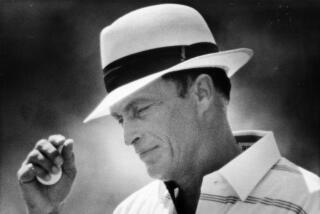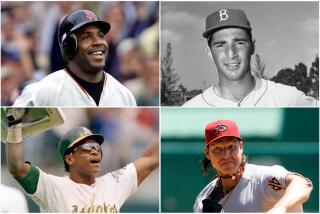The gold standard
- Share via
IT WAS ONLY FITTING that Jack Nicklaus ended his career his way, in front of his family and a smiling and sometimes weeping crowd of admirers at the world’s oldest Open, on the 18th hole, putting for a birdie. Before sinking the putt in his 38th British Open, he walked to Swilcan Bridge in St. Andrews, Scotland, stopping and waving to those who witnessed the end of a 47-year career in which he produced 18 major victories, eight senior major wins and five PGA Player of the Year awards. Not least, he is remembered as the oldest player in history to win the Masters title.
What the Golden Bear left behind at age 65, however, was more than the numbers of his legacy. He left an age when fans saw themselves in their heroes.
For the record:
12:00 a.m. Aug. 1, 2005 For The Record
Los Angeles Times Monday August 01, 2005 Home Edition California Part B Page 10 Editorial Pages Desk 0 inches; 42 words Type of Material: Correction
Jack Nicklaus: A July 23 editorial in some editions said Tom Watson defeated Jack Nicklaus by one stroke in the 1982 U.S. Open. The margin was two strokes. The editorial also said Nicklaus won 18 PGA tournaments. He won 18 major titles.
Nicklaus was not a win machine. Along with his victories came 19 second-place finishes, including the agonizing, cliffhanging 1982 U.S. Open, when he lost by two shots to Tom Watson. He was known not just for his dominance but also for his exciting rivalries with Watson and, most notably, Arnold Palmer. He made time for his fans, who shared his joy in victory and agony in defeat.
The modern sports environment no longer rewards players such as Nicklaus. In a quest to be better, quicker, faster and more commercially appealing, sports, including golf, embrace untouchable figures who can produce superhuman results.
Tiger Woods is admired (already winning 10 majors by age 29) for his dominance, not embraced for his warmth. Michael Jordan was propelled into the basketball stratosphere because of his machine-like ascendance and his off-the-charts commercial appeal, though he also bridged two eras with his easy relationship with fans and teammates. Kobe Bryant is the unpleasant modern completion of the shift to pure physical dominance. Venus and Serena Williams will be remembered as among the most powerful women in sports history but are hardly affable. Yet they merely follow in the footsteps of bad-boy pioneer Jimmy Connors and the many tantrum-prone players who followed.
Nicklaus’ departure reminds us of what seems unthinkable these days -- that frustration does not have to result in obscenities or even flamboyant argument, and that in defeat and victory alike, a competitor can be gracious.
More to Read
Go beyond the scoreboard
Get the latest on L.A.'s teams in the daily Sports Report newsletter.
You may occasionally receive promotional content from the Los Angeles Times.










